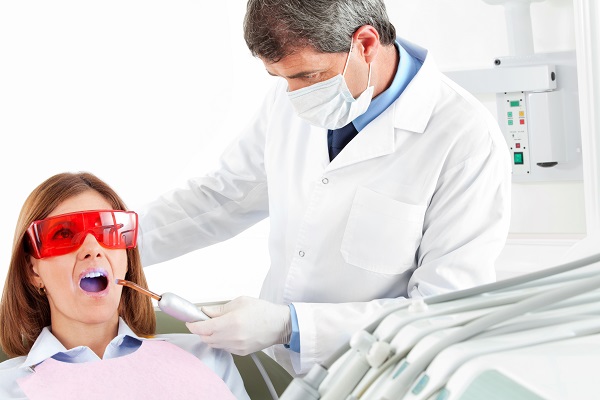How Laser Dentistry Can Treat Gum Disease

Learning what laser dentistry is and how it works is something every dental patient should do, as this allows them to make treatment choices that are right for them. Modern-day dentistry has allowed for the evolution of so many kinds of dental advancements, including laser dentistry, which has been proven to produce successful results for those suffering from oral conditions. Ready to learn more about laser dentistry?
What is laser dentistry?
According to Healthline, laser dentistry can offer a more comfortable treatment option for a number of dental procedures involving hard or soft tissue, compared to drills and other non-laser tools. Using a laser requires dental professionals to focus the laser light beam in a way that allows them to detect cavities, perform dental fillings, remove damaged tissue and reshape gum tissue (gummy smile) in order to improve a dental patient’s oral health.
A few specific procedures laser dentistry can address include hypersensitivity in teeth, treating tooth decay and treating gum disease.
About gum disease
Also called periodontal disease, when someone is diagnosed with gum disease, it means that they have a serious infection in their gums. Gum disease damages these soft tissues, making treatment by a dental professional necessary. Gum disease will not go away on its own and instead will continue to worsen until it is treated. If it is not treated in a timely manner, those diagnosed will eventually lose one or more of their teeth, as the infection will destroy the supporting bones that hold teeth in their proper positions.
According to the National Institute of Dental and Craniofacial Research, periodontal disease is an infection of the tissues that hold one's teeth in place and is typically caused by poor brushing and flossing habits that allow plaque, a sticky film of bacteria, to build up on the teeth and harden.
Treating gum disease using advanced dental procedures
Gum disease treatment requires a dental professional to thoroughly clean a patient's teeth in order to remove any plaque and tartar buildup that is stuck to the teeth. There are four stages of gum disease, which all vary in severity. Whatever stage the patient is at, will determine the depth of treatment, e.g., gingivitis, slight periodontal disease, moderate periodontal disease and advanced periodontal disease. When gum disease is treated using laser dentistry, it helps to preserve, as well as regenerate, the gum tissue.
Laser dentistry will get rid of any infected gum tissue that can cause problems, leaving the healthy tissue in place. Lasers will also help to stimulate the tissue so new and healthy cells can grow, allowing the gums, ligaments and any damaged bone to start regrowing so the gums and surrounding areas can properly heal. Once the gum tissue problems are repaired through laser dentistry, the teeth are then cleaned.
Specific benefits that come with choosing lasers to address gum disease include minimal discomfort if any, less bleeding, preservation of the gum tissue and it is a sterile treatment option that supports a faster healing process.
Got gum disease?
Now that the above information on laser dentistry has been read and understood, dental patients who are in need of gum disease treatment can decide whether or not using lasers to address their gum disease is the right choice for them. Reach out today to learn more or to get started!
Are you considering laser dentistry in the San Jose area? Get more information at https://www.ddsbaik.com.
Check out what others are saying about our dental services on Yelp: Laser Dentistry in San Jose, CA.
Related Posts
Laser dentistry became commercially available in 1989. Since then, it has grown significantly in popularity and is now the preferred form of treatment for millions of patients across the United States and worldwide. Dental lasers are used to treat a range of oral health concerns, including cavities, gum disease, and oral infections. Here, we focus…
Dental fillings are one of the oldest known methods of dental restoration. Dentists have been placing dental fillings for years as a way to stop damage and restore an unhealthy tooth. However, as modern dentistry has begun to take over, certain types of dental fillings are beginning to die out. Silver dental fillings were originally made…
Dental sealants offer patients a powerful defense against cavities. General dentists present this option to patients who need a little help preventing tooth decay. According to the American Dental Association, sealants are safe.Dental sealants provide extra protection to teeth, especially for those more prone to tooth decay. Preventing decay is essential to one's good oral…
Seeing a family dentist for a cavity treatment can target the problem teeth right away before they worsen. Many solutions are available. Discussing the process can help you make informed decisions. Here are the details on how your family dentist treats cavities.An individual cannot treat a cavity at home. The only way to get relief…


